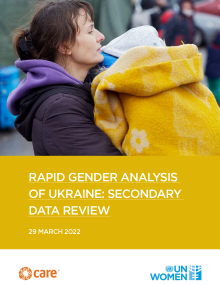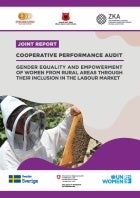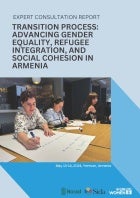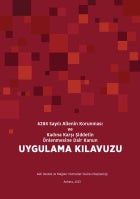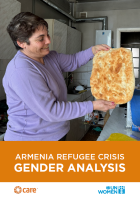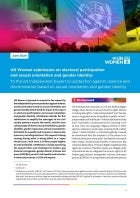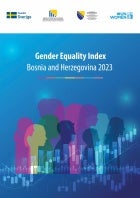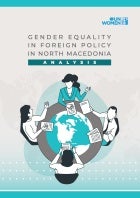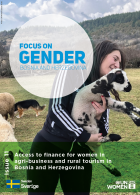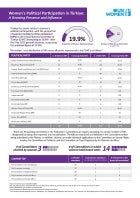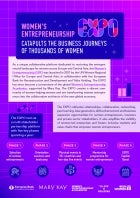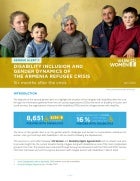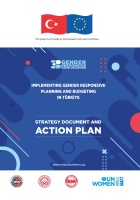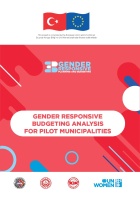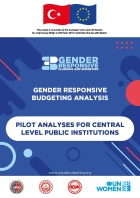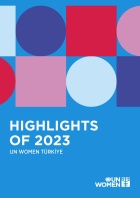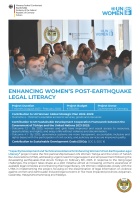Date:
This report presents observations and conclusions from national audits on the status of rural women and institutional actions for their labour market inclusion. It stems from a cooperative audit by the SAIs of North Macedonia, Albania, and Kosovo*, under a trilateral agreement to apply INTOSAI principles, promote professional cooperation, and support employee training, information exchange, and advancement of audit methodology.
Date:
This report summarizes the key highlights from the expert consultation on "Transition process: Advancing Gender equality, Refugee Integration and Social Cohesion in Armenia", which brought together more than 50 representatives of women-led and women’s rights organizations, to inform the strategic discussions around the transition process and a gender responsive Humanitarian-Development-Peace (H-D-P) Nexus in Armenia.
Date:
Law No. 6284 Implementation Guide is a crucial resource that aims to enhance the effective application of Law No. 6284 on the Protection of the Family and Prevention of Violence against Women. Aligning with international standards including CEDAW, it addresses contemporary questions in implementation, enabling judges and prosecutors to effectively uphold victims' rights in violence against women and girls context.
Date:
Joint Gender Analysis of Armenian Refugee Crisis by UN Women and CARE Caucasus.
Date:
This submission on electoral participation and sexual orientation and gender identity closely examines the opportunities and challenges for lesbian, gay, bisexual, transgender, gender diverse, intersex, and queer (LGBTIQ+) persons’ full equality and inclusion in electoral processes.
Date:
Gender Equality Index Bosnia and Herzegovina 2023 represents the second edition of the Gender Equality Index of Bosnia and Herzegovina. It is a tool to measure the progress of gender equality and compare index scores with one in the EU and Western Balkan countrires. Gender Equality Index Bosnia and Herzegovina 2023 was developed in line with EIGE methodology and it provides information for three full domains – Knowledge, Time and Power, and partly for two domains – Work and Health.
Date:
The overall goal of the analysis is to provide an overview of the situation and provide recommendations for improving gender-responsive policies, promoting capacity-building, and raising awareness among diplomats and policymakers. The broader aim is to align North Macedonia’s foreign policy with the principles of gender equality, contributing to the national and global efforts to address gender disparities.
Date:
In this edition of "Focus on Gender," we present the study's findings, emphasizing rural women in agribusiness and rural tourism ownership, their access to finance, funding opportunities, and the barriers they encounter. Additionally, this issue provides recommendations aimed at addressing these pertinent issues.
Date:
This brief serves an analysis for the general and local elections in Women's Political Participation in Türkiye.
Date:
The progress brochure “Women’s Entrepreneurship EXPO” unpacks the behind-the-scenes details and current results of the initiative launched by the UN Women Regional Office for Europe and Central Asia in 2021, in collaboration with the European Bank for Reconstruction and Development and Yıldız Holding. The EXPO, dedicated to women entrepreneurs or those aspiring to become entrepreneurs, has emerged as a cornerstone of the global Women’s Entrepreneurship Accelerator.
Date:
Soru Cevaplarla Şiddetle Mücadele Rehberi" (Guide to Combatting Violence with Questions and Answers) provides clear steps and resources for women facing violence, ensuring safety, legal protection, and support.
Date:
5 Adımda Adli Yardım Kapsamında Avukat Desteği (5 Steps to Legal Aid) is a concise guide offering a roadmap for accessing legal assistance, highlighting support from Legal Support and Victim Services Directorates (Adli Destek ve Mağdur Hizmetleri Müdürlükleri).
Date:
Deprem Kaynaklı Sorunlara İlişkin Haklarınız (Your Rights Regarding Earthquake-Related Issues) is a brochure summarizing legal rights and procedures for those affected by earthquakes, providing essential information for navigating earthquake aftermaths and accessing support.
Date:
Six months after the Armenia Refugee crisis, the needs of refugees with disabilities are yet to be met especially women and girls with disabilities. The Gender Alert No.2 highlights the situation of the refugees with disabilities and provides insight into the gender-specific challenges and barriers to humanitarian assistance for women, men, girls and boys with disabilities in the six months following the displacement.
Implementing Gender-Responsive Planning and Budgeting in Türkiye - Strategy Document and Action Plan
Date:
Gender Responsive Budgeting Strategy Document and Action Plan aims empowering women and achieving gender equality in Türkiye through the systematic and sustainable integration of gender equality perspective into the national and local policy making, planning, and budgeting processes.
Date:
This booklet shares insights into the gender-responsive budgeting analyses that were conducted in selected pilot municipalities within the scope of the Implementation of Gender Responsive Planning and Budgeting in Turkey Project.
Date:
This booklet shares insights into the gender-responsive budgeting analyses that were conducted in selected central level public institutions within the scope of the Implementation of Gender Responsive Planning and Budgeting in Turkey Project.
Date:
2023 posed significant challenges due to the earthquakes on February 6, causing widespread destruction and loss of life in 11 provinces. The Highlights 2023 report narrates UN Women Türkiye's journey throughout the year, showcasing its work and main results achieved under its programmes and campaigns.
Date:
The brief on the "Enhancing Women's Post-Earthquake Legal Literacy" provides information about the project which marks the first partnership between UN Women Türkiye and the Union of Turkish Bar Associations (UTBA), addressing urgent need for legal support and empowerment following the devastating earthquakes that struck Türkiye on February 6th, 2023.
Date:
The infographic sheds light on the impact of childcare responsibilities on women’s labour force participation in North Macedonia based on a detailed analysis and visualization of data from official statistics and publicly available research. The product presents solutions such as investing in daycare, involving fathers, promoting flexible work arrangements, and introducing paid parental leave to support working mothers and foster a family-friendly economy.
